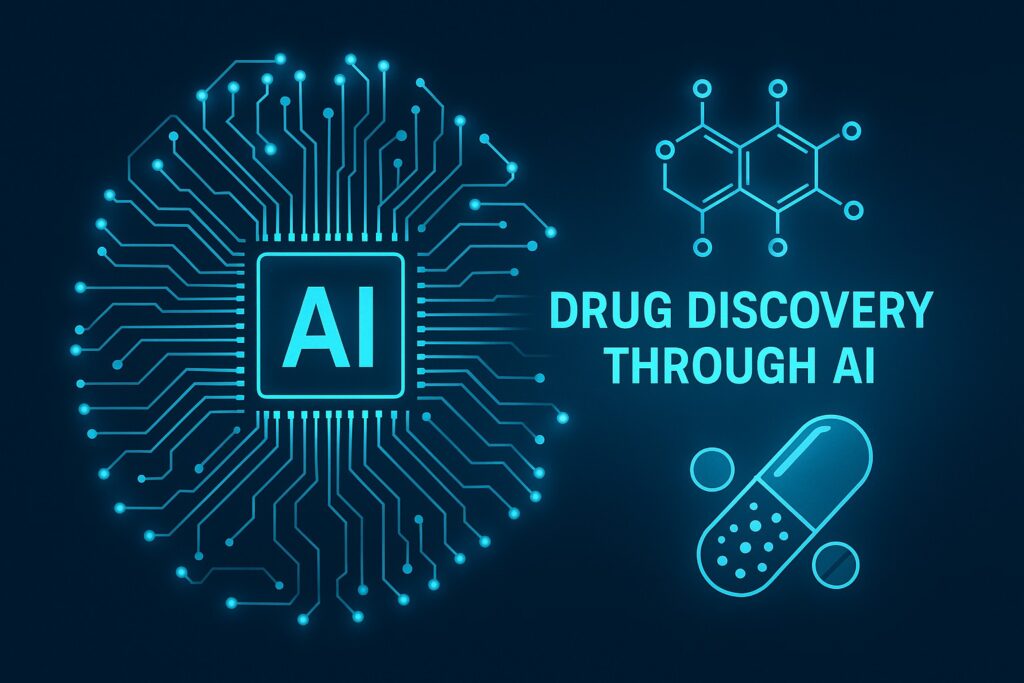Table of contents
The process of developing new medicines has been long, expensive, and complex. Traditionally, it takes about 15 years and over a billion dollars to bring a new drug from the lab to the market. But now artificial intelligence is reshaping the entire drug discovery process. AI-powered drug discovery is not just a futuristic idea; it is happening today, making the process faster, cheaper, and smarter. In this article let’s see what AI-driven drug discovery is and WHY IT MATTERS and HOW IT WORKS.
What is AI-Powered Drug Discovery?
AI-powered drug discovery refers to the use of artificial intelligence and machine learning algorithms to increase the speed of the creation of new pharmaceutical products. Instead of relying completely on traditional methods in laboratories, AI models can analyze large data sets, predict how molecules will behave, and suggest the best candidates (molecules and products) for development.
This approach helps scientists to skip many time-consuming steps and rapidly screen thousands or millions of chemical compounds. This helps to focus only on the most likely candidates
Why is AI involved in drug discovery?
1. Speed up the Process
Traditional drug discovery is a very long process. It takes 5 to 7 years just to discover a normal drug, followed by several more years of testing and regulatory approvals. AI reduces the time needed to identify the potential and perfect drug candidates from years to months or even weeks by analyzing the huge databases in seconds.
2. Reducing Costs
Truck development is expensive, costing over 1 billion per drug on average. AI helps reduce costs by automatic data analysis, reducing unnecessary lab experiments and focusing on resources which are the most promising compounds
3. Better Accuracy
AI models can identify patterns and relationships that humans might miss, leading to more accurate predictions of how molecules interact, potential side effects, and their effectiveness against the diseases.
4. Personalized medicine
AI doesn’t only help discover drugs faster; it also enables the development of certain therapies that are specifically personalized to individual patients’ genetics or conditions. This helps improve the effectiveness and reduce the side effects.
How AI-Powered Drug Discovery Works
AI in drug discovery uses several advanced technologies and methods, including
Data Mining & Integration
AI systems collect and process data from millions of scientific papers and clinical trials and genetic databases and even chemical libraries. This creates a massive knowledge base for learning and predictions.
Predictive modelling
Using machine learning AI models analyzes how different molecules interact with each other and how they interact with the biological targets, like proteins in the body. By predicting the strength of these interactions, AI can suggest the most promising drug candidates.
Generative Models
Generative algorithms such as deep learning models can even suggest entirely new molecular structures that don’t exist in databases. They are likely to interact with the desired target in a very beneficial way.
Simulating Clinical Trials
AI can simulate how a new drug candidate would behave in virtual models of the human body. This predicts potential side effects or efficiency without even real-world testing.
Real-World Examples of AI in Drug Discovery
1. Exscientia
It is one of the world’s leading AI-driven drug industry companies. It developed drug candidates for OCD in just 12 months. The OCD drugs generally take time, up to several years, to be generated. Their platform uses AI to design molecules, test their effectiveness, and select promising candidates.
2. silico Medicine
In silico medicine uses algorithms to discover novel drug candidates and repurpose the existing drugs for some other new uses. Their AI platform successfully identified several potential drugs for diseases like cancer and Covid-19at the time of need.
3. Atomwise
Atomwise applies deep learning to predict how molecules work and bind with the targets in the body. In partnership with the academic institutions and pharmaceutical companies, it has identified potential compounds for diseases like ebola and much more faster than the traditional methods.
Challenges in AI Drug Discovery:
While there are plenty of benefits, AI-driven drug industries is not without its challenges
* AI Reliance on high-quality and structured data. In many cases data is segmented and inconsistent, which is making it difficult to create proper accurate models.
•Even if AI discovered the promising drug candidate, it still has to go through a large amount of clinical trials and approvals, which is time-consuming and expensive. AI accelerates the discovery phase but can’t fully replace the traditional safety testing.
* AI-generated drug discoveries raise certain ethical questions, such as the transparency of algorithms and data that may result in less effective drugs for certain people.
The future of AI in healthcare
The future of AI-powered drug Discovery looks extremely promising as technology improves.
1. We are moving towards fully automatic drug discovery pipelines where AI handles everything from target identification to candidate selection.
2. AI will increasingly enable the development of high personalized medicines based on individual genetics and health data
3. Many companies are now building AI platforms allowing pharmaceutical companies and academic researchers and the government to share the data and accelerate the process.
4. In the future AI will not only help discover new drugs but also continuously monitor patients taking them and adjust their dosage or switch the treatments in real life.
Conclusion
AI-powered drug Discovery is a game changer in healthcare. By reducing time, cutting costs, and improving accuracy, it has already increased breakdowns in fields like neurology and infectious diseases.
Although challenges such as data quality and ethical concerns remind us of the continued development of AI in the drug industry, the promise of the future is that medicines will be developed faster and smarter and be more personalized to individual patient needs.
We can expect the next decade to deliver more life-saving treatments and a more efficient health care system that focusesnot only on curing diseases but also on preventing them.



